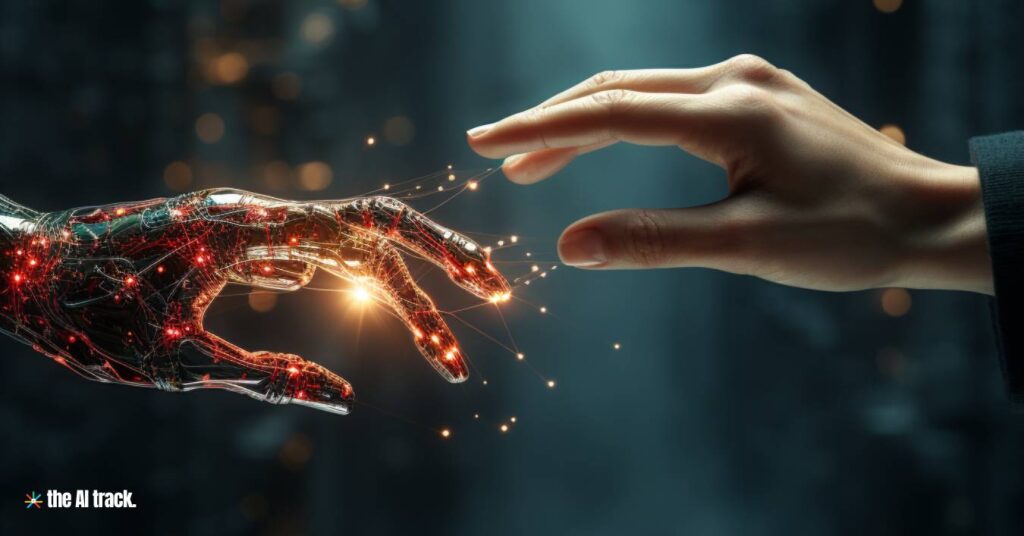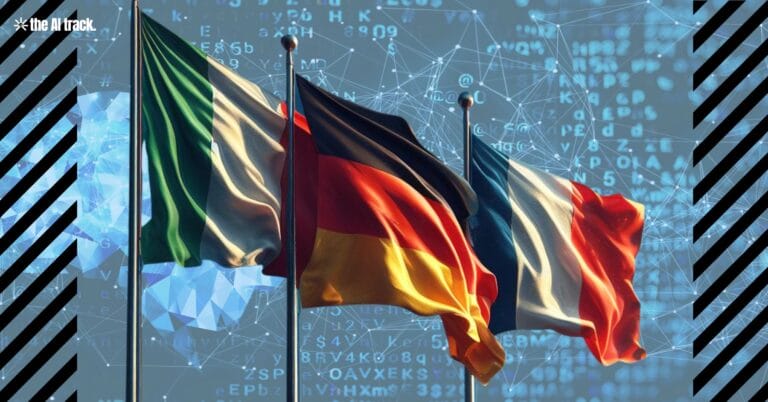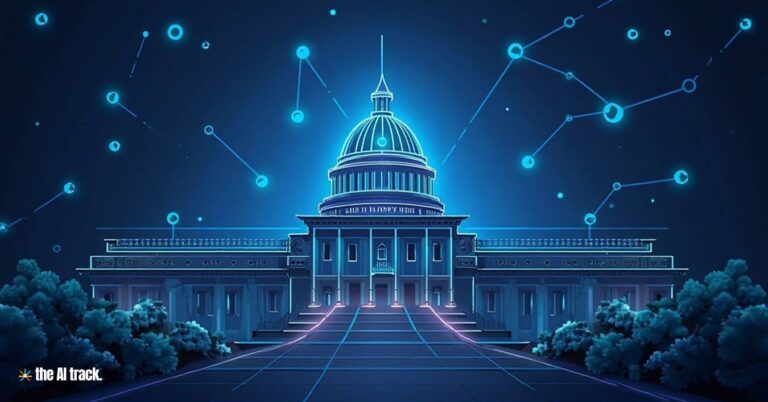A Deep Dive into the Complex Web of Control and Why the Ownership of Artificial Intelligence Matters More Than You Think
Jump to Sections

Artificial Intelligence (AI) is transforming industries from healthcare to transportation, leaving an indelible mark on our world. However, in this AI-driven era, a perplexing question arises: who exactly owns artificial intelligence? The ownership of AI is a multi-faceted conundrum, akin to a complex puzzle, involving various stakeholders, power dynamics, and legal intricacies.
To unravel this enigmatic realm, we must embark on a journey through the historical origins, key players, and driving forces behind the ownership of artificial intelligence. Brace yourself as we delve into the complexities surrounding AI ownership, intellectual property rights, and the implications of this technological revolution.

The Ownership of Artificial Intelligence: Setting the Framework
AI is a complex technology in its nascent stages, and there is no singular legal or ethical framework that can adequately address all potential issues surrounding its ownership and responsibility.
To understand the landscape of the ownership of artificial intelligence, it’s essential to look at the generative AI tech stack, which can be divided into three layers:
- Infrastructure: Cloud platforms and hardware manufacturers running training and inference workloads for AI models.
- Models: AI products’ powerhouses, available as proprietary APIs or open-source checkpoints.
- Applications: User-facing products that integrate generative AI models, either via their pipelines or third-party APIs. This structure highlights the interplay between different layers and stakeholders in the AI ecosystem, with infrastructure vendors currently capturing the majority of the market’s monetary flow.
The different components of AI systems encompass:
One way to view the ownership of Artificial Intelligence is in terms of the different components of AI systems. These components encompass:
- The AI code itself
- The data that is used to train and operate the AI system
- The hardware that the AI system runs on
- The intellectual property rights associated with the AI system
Different entities may hold ownership rights over these distinct components. For instance, a company could own the copyright to the AI code, while the data used for training might belong to the system’s users.
Furthermore, the ownership of AI can be viewed through the lens of the various roles played by individuals and organizations in its development and deployment. These roles include
- The developers of the AI system
- The companies that deploy and use the AI system
- The people who interact with the AI system
Each role carries different responsibilities, such as ensuring safety and reliability (developers), responsible and ethical usage (companies), and acknowledging the system’s limitations (users).
As AI technology continues to evolve, the question of the ownership of artificial intelligence is likely to become increasingly complex. It is imperative to engage in public discourse to develop legal and ethical frameworks that ensure AI is harnessed for the collective benefit of society.

The Origins of the Ownership of Artificial Intelligence: Tracing the Roots
To comprehend the present state of the ownership of artificial intelligence and answer the burning question, we must delve into the past. AI’s journey began with the inception of the concept itself in the 1950s, when the term “artificial intelligence” was coined to envision machines capable of simulating human intelligence. But who laid claim to this visionary field?
John McCarthy, an American computer scientist, is often credited with coining the term and founding the field of AI. However, the development of AI involved contributions from numerous researchers worldwide, laying the groundwork for a complex web of intellectual property rights surrounding AI inventions and algorithms.

The AI Talent Wars: Shifting Ownership from Academia to Corporations
In the early days of AI, pioneering research predominantly occurred within academia. Universities like Carnegie Mellon, MIT, and Stanford pushed the boundaries of neural networks and machine learning, with their computer science professors and Ph.D. students publishing groundbreaking papers on techniques such as deep learning.
However, starting around 2010, private tech companies entered an “AI talent war” as they raced to recruit these very academics. Companies like Google, Facebook, Apple, and Microsoft offered lucrative salaries and resources that universities struggled to match, luring AI experts away from academia.
As just one example, Carnegie Mellon professor Alex Smola left academia to become Amazon Web Services’ director of machine learning. As Wired reported in 2017:
“In little more than a decade, Smola’s expertise in AI software has propelled him from Carnegie Mellon adjunct professor—making about $80,000—to Amazon director of machine learning—for about $200,000.”
So today, most AI research happens in the private sector. In 2021, tech company investment in AI totaled $67.9 billion according to Canalys, while the U.S. government spent just $2.6 billion.
This talent migration has accelerated AI progress but also concentrated AI ownership and control within a few corporations.

The Key Players: Corporations, Academia, and Governments
Corporations recognized the immense potential of AI, leading to a surge in private sector involvement. Tech giants like Google, Microsoft, and Amazon invested heavily in AI research and development, creating their own AI ecosystems.
Academia, however, remains a crucial player, with universities and research institutions continuing to push the boundaries of AI knowledge. Open-source projects and academic research have democratized access to AI tools and knowledge, fostering innovation and contributing to the collective understanding of AI.
Despite the rapid growth in generative AI applications, the value accrues unevenly across the market. Infrastructure vendors, such as cloud providers, capture a significant portion of the revenue due to their essential role in hosting AI workloads. Meanwhile, application companies often struggle with retention, product differentiation, and gross margins. Model providers, despite being central to AI’s development, have yet to achieve large-scale commercial success. Understanding these dynamics is crucial for predicting future trends in the control and ownership of artificial intelligence.

The Legal Landscape: Patents, Copyrights, and Trade Secrets
The ownership of AI is not solely about ideas; it also involves legal protections. Patents, copyrights, and trade secrets play a vital role in safeguarding AI innovations, creating a complex web of intellectual property rights surrounding AI technologies.
Legally, companies own the AI systems created by their employees. But there are some nuances:
- Patents: Companies can patent specific AI techniques their engineers invent. For example, IBM has patented deep question-answering systems.
- IP Agreements: Employment contracts often state that IP developed on company time belongs to the company. This transfers AI ownership from individual engineers to their employers.
- Copyrights: Copyrights come into play when AI-generated content, such as art or music, is at stake. Who owns the creative output of AI algorithms—a human creator or the entity that developed the AI?
- Trade Secrets: Broad techniques like deep learning algorithms are usually protected as trade secrets rather than patents. Trade secrets protect valuable AI-related information, such as proprietary algorithms and data collection methods. Companies guard these secrets zealously to maintain a competitive edge.
- Data: AI training data is another huge asset. Companies invest in curating their own proprietary datasets.
Patents are used to protect specific AI techniques invented by engineers, while copyrights come into play when AI-generated content, such as art or music, is at stake. Trade secrets, on the other hand, protect valuable AI-related information like proprietary algorithms and data collection methods, which companies guard zealously to maintain a competitive edge.
Furthermore, AI training data is another crucial asset, with companies investing heavily in curating their proprietary datasets. This data ownership confers a significant advantage in developing AI models and applications, highlighting the power dynamics at play in the ownership of artificial intelligence.
Model providers, who are responsible for significant AI advancements, face several challenges in achieving commercial scale. Open-source models, for instance, allow anyone to host and use them, reducing the proprietary models’ competitive edge. Furthermore, model providers must balance innovation with monetization, often incorporating public good into their missions, which complicates their commercial strategies. These challenges underscore the complexity of maintaining a leading position in the rapidly evolving AI market.
The concentration of power in Big Tech, particularly firms like Microsoft, Amazon, and Google, has significant implications for the ownership of artificial intelligence. These companies control crucial AI infrastructure and influence policy and research agendas. The dominance of Big Tech raises concerns about monopolies, data privacy, and the potential misuse of AI, as these firms leverage their vast resources and market reach to shape the future of AI.

The Power Dynamics: Data as the New Gold
In the AI realm, data is often referred to as the new gold, with the ownership of vast datasets conferring a significant advantage in developing AI models and applications. Tech companies that collect and control massive amounts of user data wield considerable influence and power in the AI ecosystem.
Consider Facebook, a social media giant that collects data from billions of users. This data fuels its AI algorithms, enhancing user experiences, advertising targeting, and other applications. This data-centric approach has made companies like Facebook powerful players in the AI ownership game, solidifying their dominance and control over AI technologies.
However, this concentration of power and data ownership in the hands of a few tech giants has sparked concerns about monopolies, data privacy, and potential misuse of AI. As a result, there is a growing call for increased regulation and scrutiny of these companies’ data practices and AI development processes.
Infrastructure vendors, particularly cloud providers like AWS, Google Cloud, and Microsoft Azure, play a pivotal role in the AI ecosystem. These companies handle the vast majority of AI workloads, making them indispensable for model providers and application developers. However, they face challenges such as maintaining customer loyalty in a market where AI workloads are highly portable and managing supply constraints for high-demand GPUs. The dominance of infrastructure vendors illustrates the central role they play in AI’s ongoing development and commercialization.
The Rebellion Against Big Tech AI: Calls for Open and Ethical AI Research
The shift of AI research from academia to corporations has been a boon for business, but many scientists worry it’s detrimental to the pursuit of knowledge. Some draw parallels to climate change research, where oil companies have influenced scientific findings to protect their interests.
In 2021, over 1,900 AI experts, including leaders like Yoshua Bengio, signed the Conscientious AI pledge, calling for more open and ethical AI research. The petition states:
“We will avoid working on AI projects that will disproportionately harm or deceive vulnerable populations…”
There are also rising calls for the breakup or regulation of tech monopolies on data and AI models, treating them as public utilities. While companies legally own most AI, many researchers question whether AI should be owned at all or treated as an open public resource.

The Ethical Dimensions: Responsibility and Accountability
AI ownership also raises ethical questions about responsibility and accountability. Who is responsible if an AI system makes a biased decision or causes harm? Is it the developer, the owner, or the AI itself? These ethical dilemmas have spurred discussions about regulating AI and holding organizations accountable for the consequences of their AI systems.
Some argue that AI should be considered a legal entity with its own rights and responsibilities, akin to corporate personhood. This approach could help establish clear lines of accountability and liability for AI-related incidents or misuse.
The recent OpenAI saga, where leadership changes and corporate maneuvers highlighted the influence of Big Tech, underscores the need for transparency in AI development. The incident demonstrates how quickly the AI landscape can shift, with significant implications for AI governance.
Addressing these ethical concerns is crucial to ensuring the responsible development and deployment of AI technologies, as well as maintaining public trust in AI systems. Failure to do so could lead to significant societal and economic impacts, further highlighting the importance of addressing the governance and ownership of Artificial Intelligence.
The Ownership of Artificial Intelligence: Alternative Models
Given the concerns surrounding private control of AI, there is a growing interest in exploring alternative models for the governance and ownership of Artificial Intelligence. Some potential approaches include:
- Public Research: Governments could increase grants for university research on AI safety, ethics, and responsible development, fostering a more open and diverse AI ecosystem.
- Tech Worker Activism: Employee pressure has pushed some companies to create internal AI ethics teams and initiatives, giving workers a voice in shaping AI development.
- Open Source: Projects like TensorFlow and Weights & Biases have brought academic-style openness to industry AI, improving transparency and collaboration.
- AI Unions: New advocacy groups aim to give tech workers and community voices more say in how AI is built and used, promoting public accountability.
- Public-Private Partnerships: Collaborations between governments, academia, and private companies could help align AI progress with public interests and ethical principles.
Regulation could help address the concentration of power in AI. Government policies should focus on mandating transparency in AI development and ensuring that AI is developed and deployed responsibly. Bold regulatory measures are needed to separate different layers of the AI stack and prevent Big Tech from consolidating its dominance in the market. By prioritizing public interests over corporate profits, regulation can help create a more equitable and accountable AI ecosystem.
Frequently Asked Questions
Why is the ownership of AI such a complex issue?
The ownership of AI involves various components, stakeholders, and legal aspects, making it a multi-faceted and intricate matter. It encompasses the ownership of AI code, data, hardware, intellectual property rights, and the roles of developers, companies, and users.
Who are the key players in the ownership of AI?
The key players in AI ownership include corporations like Google, Microsoft, and Amazon; academia and research institutions; and governments, each playing a vital role in shaping the AI landscape through research, development, and regulation.
How do companies protect their AI ownership?
Companies protect their AI ownership through legal means such as patents, copyrights, trade secrets, and intellectual property agreements with employees. They also invest in curating proprietary datasets and guard their AI algorithms and data collection methods as trade secrets.
Why is data ownership so crucial in the AI realm?
Data ownership is crucial because data is often referred to as the “new gold” in the AI realm. Owning vast datasets confers a significant advantage in developing AI models and applications, giving companies that control massive user data a substantial edge.
What are the ethical concerns surrounding AI ownership?
AI ownership raises ethical questions about responsibility and accountability for biased decisions or harmful actions by AI systems. There are debates about whether AI should be considered a legal entity with its own rights and responsibilities, and how to hold organizations accountable for the consequences of their AI systems.
What are some alternative models for AI ownership?
Alternative models for AI ownership include increased public research funding, tech worker activism, open-source projects, AI unions, and public-private partnerships. These models aim to promote more open, ethical, and responsible AI development.
Can AI be truly "owned" by anyone?
There is a growing debate about whether AI should be owned at all or treated as an open public resource, given the potential for misuse and the need for transparency and accountability in AI development and deployment.
How can governments regulate AI ownership?
Governments can regulate AI ownership through policies and legislation related to data privacy, antitrust laws, intellectual property rights, and ethical guidelines for AI development and deployment.
Will the ownership of AI continue to be a contentious issue in the future?
As AI technology advances and its impact on society becomes more significant, the ownership of AI is likely to remain a contentious and evolving issue, requiring ongoing discussions and adaptations to legal and ethical frameworks.
Key Takeaways
- Most AI is currently owned by large tech companies that recruit academic researchers with lucrative salaries and resources.
- Legally, companies own AI developed by employees, protected by patents, trade secrets, and intellectual property agreements.
- However, many scientists advocate for more open and ethical models, such as public and non-profit research, to counterbalance corporate control over AI.
- Alternative ownership models could include government funding for public AI research, tech worker activism, open-source projects, AI unions, or public-private partnerships.
- The ideal future for AI ownership and governance likely combines elements of open research, thoughtful regulation, corporate responsibility, and multi-stakeholder participation.
- Addressing the complex issues surrounding AI ownership is crucial to ensuring the responsible development and deployment of AI technologies, maintaining public trust, and aligning AI progress with ethical principles and societal interests.
Sources
- AI 101: Who Owns the Output of Generative AI? | Lewis Silkin, 02 February 2023
- AI Created It, But Who Owns It? | American Enterprise Institute – AEI, March 23, 2023
- The Privatization of AI Research(-ers):
Causes and Potential Consequences | Roman Jurowetzki, Daniel S. Hain, Juan Mateos-Garcia, and Konstantinos Stathoulopoulos, February 15, 2021






